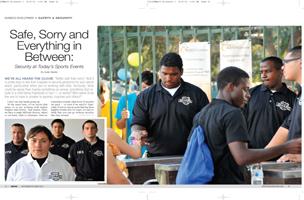
 We've all heard the cliché, "Better safe than sorry." And it is pretty easy to see that it applies to security personnel for your sports event, particularly when you're working with kids. Seriously: what could be worse than having something go wrong, something that results in a child being frightened or hurt -- or worse? Who wants to be the one to have to answer to parents, coaches and others?
We've all heard the cliché, "Better safe than sorry." And it is pretty easy to see that it applies to security personnel for your sports event, particularly when you're working with kids. Seriously: what could be worse than having something go wrong, something that results in a child being frightened or hurt -- or worse? Who wants to be the one to have to answer to parents, coaches and others?
I don't see any hands going up.
 At the same time, it's no secret that many of us are working with tighter budgets than before. That means, often, we have to make difficult choices: where to cut back, what to eliminate. And we sometimes wonder what level of security we need -- or even if we need it. Especially if you've run an event that has been happily trouble-free for years, it's easy to think that you can go without security this time around. After all, you think, these are kids. Not pros. How much security can anyone really need?
At the same time, it's no secret that many of us are working with tighter budgets than before. That means, often, we have to make difficult choices: where to cut back, what to eliminate. And we sometimes wonder what level of security we need -- or even if we need it. Especially if you've run an event that has been happily trouble-free for years, it's easy to think that you can go without security this time around. After all, you think, these are kids. Not pros. How much security can anyone really need?
 I'm not going to stand here and say you shouldn't have security; it's what I do for a living, after all. And if I didn't believe in it, I wouldn't be here. But as a parent, I'm going to tell you that I absolutely believe in having security, and particularly at sports events where the athletes, and even the fans, include children. Here are three reasons.
I'm not going to stand here and say you shouldn't have security; it's what I do for a living, after all. And if I didn't believe in it, I wouldn't be here. But as a parent, I'm going to tell you that I absolutely believe in having security, and particularly at sports events where the athletes, and even the fans, include children. Here are three reasons.
Children are vulnerable. Okay, that's not exactly a bulletin. Everyone knows that kids don't always use the best judgment. They wander away from the groups they're supposed to be with. They get out their phones, talk to people, chat online with strangers and they pose for photos with their friends, even when the photographer isn't necessarily someone they know. And in a sports event where a lot of kids are present -- well, it's possible that not every person who shows up is going to be someone who is there just to cheer kids on.
 In this case, a visible security presence can go a long way toward helping deter predators (or even problem spectators) from getting too close. A good security guard is trained as an observer, and from a law enforcement standpoint, can look for any red flags in the behavior of adults or kids. Security personnel can be on the lookout for adults who are representing themselves as media officials, athletic personnel or others, in order to get closer to the kids. A good security officer will be able to insist on seeing credentials, and can head off potential problems before they start.
In this case, a visible security presence can go a long way toward helping deter predators (or even problem spectators) from getting too close. A good security guard is trained as an observer, and from a law enforcement standpoint, can look for any red flags in the behavior of adults or kids. Security personnel can be on the lookout for adults who are representing themselves as media officials, athletic personnel or others, in order to get closer to the kids. A good security officer will be able to insist on seeing credentials, and can head off potential problems before they start.
Children aren't the only problem. These days, athletic officials are apt to tell us to keep an eye on parents. The good news is that parents today are more involved with their kids' sports events than ever before. They cheer, encourage and motivate their kids from the stands. The bad news? Again: parents today are more involved with their kids' sports events than ever before. And some of them can get too caught up in the game and fall into bad behaviors: shouting at coaches and referees, and getting into confrontations, shoving matches and even fights with parents from the opposing teams. It's embarrassing and distracting to the kids, and it puts a damper on the whole game for them. It also disrupts play and leaves everyone upset. And not surprisingly, it sets a bad example.
 |
| Susan Leggett/Dreamstime.com |
These situations tend to erupt because of a number of factors -- not all of which are bad. Parents love their kids and they're proud of them. Nothing wrong with that. Lots of parents would love to think they are raising the next Lebron James or Hope Solo. Nothing wrong with that either, really. But the economy is bad and they want their child to get an athletic scholarship, so of course they want him or her to have plenty of playing time. And they don't want him or her benched, struck out, fouled or anything else. They get frustrated and angry, and feel like an opposing player, or an official or coach is costing their child a big chance. One thing leads to another, and suddenly, it becomes a big problem in the stands. It might even lead to an ugly confrontation with an official after the game is over.
Trained security personnel can size up a situation like this very quickly before it becomes a problem. They can step outside the box and put themselves in the other person's shoes. They can talk to the person, or people, help defuse the situation, and allow the game to continue uninterrupted. They can see the way a parent is approaching an official after the game and get there before trouble starts. Sometimes, it becomes a matter of protecting people from their own behavior, or stopping them from making an extremely bad judgment in a rash moment.
The world has changed since we were kids. There have been rivalries as long as there have been high school sports, but these days, you also have to be prepared for fact that some kids just show up at games looking for a fight. Sometimes, it's a turf war between students who are from opposing schools, or sometimes, two students who got into a shoving match in the halls earlier in the day will find themselves seated near one another in the bleachers. There might even be, unfortunately, some students with gang ties.
 In an effort to save money, schools often will recruit teachers, and even parents, to do volunteer work and help keep order at a game. In many cases, those people, particularly if they're parents, aren't trained in what to do in the event of a fight or confrontation. The money saved isn't going to be worth much if a fight erupts, spills out of the stands and onto the court or playing field, and takes in other students and players. Breaking up a fight is as much of a skill as it is a physical job. Defusing a fight before it begins? That's just as valuable. Save your volunteers for tasks like ticket-taking and selling souvenirs. Let them know if a security guard will be present, and how to find him or her in the event of an emergency.
In an effort to save money, schools often will recruit teachers, and even parents, to do volunteer work and help keep order at a game. In many cases, those people, particularly if they're parents, aren't trained in what to do in the event of a fight or confrontation. The money saved isn't going to be worth much if a fight erupts, spills out of the stands and onto the court or playing field, and takes in other students and players. Breaking up a fight is as much of a skill as it is a physical job. Defusing a fight before it begins? That's just as valuable. Save your volunteers for tasks like ticket-taking and selling souvenirs. Let them know if a security guard will be present, and how to find him or her in the event of an emergency.
So, keeping in mind those three points, it's obvious that today's sports events can require security. But for those who are budget conscious (like, oh, perhaps 100% of those reading this article), here's a bit of good news. Security isn't like a true/false test. You don't have only two options: Safe or sorry. You can opt for safe, and get the level of security you need, without going overboard.
 Basic security includes crowd management, answering questions, reuniting parents with kids who have wandered off, and so on. We like to say our security guards are in the guest services business because in a sense, they are -- they wind up having to answer questions, give directions and so on, in addition to doing their regular job of maintaining law and order.
Basic security includes crowd management, answering questions, reuniting parents with kids who have wandered off, and so on. We like to say our security guards are in the guest services business because in a sense, they are -- they wind up having to answer questions, give directions and so on, in addition to doing their regular job of maintaining law and order.
Law enforcement might some or all of the previous jobs, but might also do work like inspecting purses and backpacks of spectators, using metal detectors or wands, and so on. These guards require more training, and will come at a higher hourly rate There are various levels of precautions you can take, and each will have a graduating cost. Know what you need -- and what you don't.
Not sure what you need? Meet with your potential security firm and discuss your event. In addition to the logistical information (when, where, number of participants and spectators, etc.), let the company know if there have been any problems in the past (fights, arrests, etc.), whether alcohol will be served at the event, and any specific concerns you may have. A good security company will work with you. After all, it's in their best interest, yours, and above all, that of the athletes, for all of you to have an event free of any problems.

